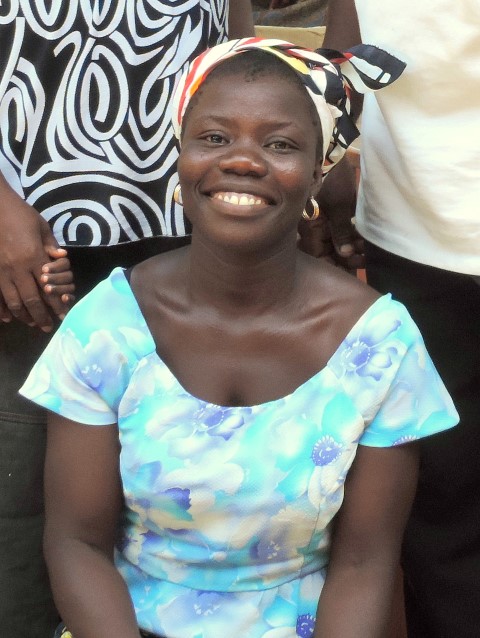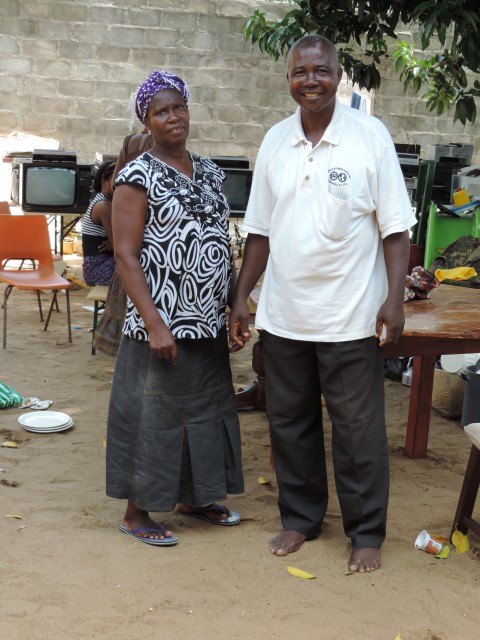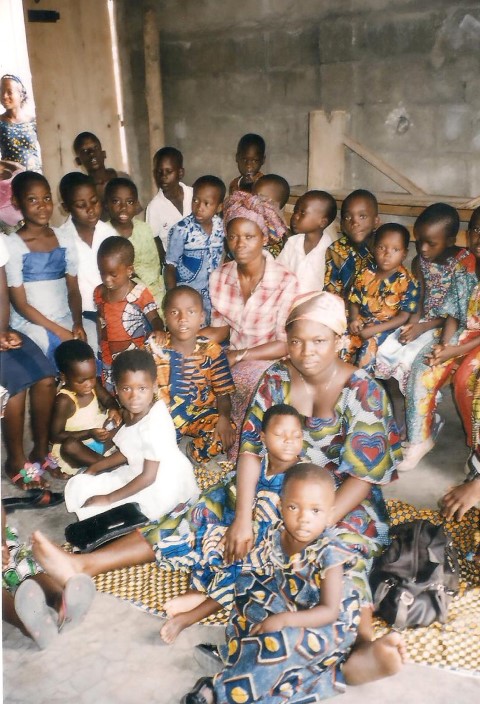ITSDF
International Technical, Agricultural and Social Development Foundation
The Media Centre
The ITSDF recently opened a Media Centre in Lomé. The project was launched May 1, 2014, and an account was opened for financial support.This project is designed to inform the local population about a variety of topics, such as health and food preparation, through informative and educational programs.
We are trying to generate a very broad support for three subject areas in this project: location, materials and finances.The ITSDF also examines if it is possible to arrange traineeships for employees at several manufacturing plants, or to have employees take a look at the production process.
If you are interested in this project, please contact us, so you can receive further information. You can send us a message through the contact form on the web site.
100 houses (social housing) in West Africa
The idea for this social housing project (building 100 houses with basic amenities in West Africa) came up during a conversation with Pastor Daniel. The current living situation still is a house with a single room of 3.5 by 4 metres.
The ITSDF developed a plan in which, at first, 100 houses with the minimum necessary amenities will be built. Some of these amenities are: improved toilet, laundry and shower facilities, and of course clean, running water. Additionally, the houses will have at least three bedrooms: one for girls, one for boys, and one for the parents.
Why 100 houses? The idea is that this number of houses should generate enough rental income for the manager to independently finance andrealisethe construction of additional houses on a small scale. The ITSDF will also provide guidance during this additional construction process, until it has become sufficiently clear that the manager is able to develop the project independently. The ITSDF will then gradually phase out the aid. For the project to succeed, it is also necessary to build a maintenance workshop.
An agricultural school in West Africa
During a visit to the towns Kpalimé and Kpando (Ghana), ITSDF’s president was faced with a societal and social problem. The people that live off agriculture have to get by on the little food that their nutritionally poor farmland provides. The one free thing is the water that comes from the river.
The low level of crop production is one of the many problems. It is well known that mechanisation and fertilisers can increase crop production levels, but Africans lack the financial means and the know-how to implement these techniques. Africa has a large agricultural potential; however, much of the agriculture is still carried out manually, on plots of land of up to 1.5 hectares (ca. 4 acres).
Practice-oriented education needs to be set up to solve this problem for the future. The ITSDF wants to establish a school with a broad approach and an international profile, providing education also for the surrounding countries. More of such schools, distributed regionally across West Africa, will be established in the future.
The Fish auction
The entire fish auction should be renovated or, even better,complete rebuild and expanded with a business cluster for fish trading and processing. The firm Knol advised the ITSDF to give this some thought.
The ITSDF responded to this advice by contacting various organisations as well as the Minister of Development Cooperation, to jointly consider if (and to which extent) they would be interested in providing technical and financial support. The organisations PUM Netherlands and Exchange (Belgium) were also approached. Additionally, Mr. A. Domtani, Director of the Ministry of Fishery in Togo, was approached by a representative of the ITSDF. Through Mr. Domtani we have contact with the Ministry and the Togolese government.
At its own expense, the ITSDF made an analysis of the problems. A complete renovation will have to be carried out in order to modernise the fish auction, allowing it to achieve international prestige in the future. Training programs in the areas of fishery, ship navigation, and hygiene should also be established. These areas are ripe for investment.
Maman Sogadje
Maman Sogadje is a 34-year old woman. She is married and has two children. Additionally, she looks after the children of her family, her friends, and local residents (when they have to work); she is financially compensated for this. Her work is appreciated and, therefore, the demand for her services is increasing. For this reason, Maman wants to take a more professional approach to her job.
She approached the ITSDF to help her realise her goals, and she asked the foundation for technical and financial support. The ITSDF thought this was a great initiative and the foundation provided Maman with a land lot. However, more is needed to help her realise her plans. An action plan will be made, with an emphasis on hygiene and safety. Additionally, the accommodation and (sanitary) facilities play an important role. The ITSDF hopes to find a partner, so that, in the future, Maman can help yet more people with her effort, enthusiasm, and great services.
Inland Fishing Association project
While exploring possibilities and locations for fish farming in Ghana and Benin, the ITSDF regularly had contact with inland fishermen. In these two countries, nobody is able to make a living off inland fishing. This is because inland fishing is totally unregulated; everyone has the opportunity to go fishing. This results in overfishing, and ever smaller fish (about 5 to 6 cm) are caught.
The absence of an interest group is a major shortcoming. For that reason, the sector is unhealthy and it will stay that way in the current situation.
For this reason, the ITSDF has offered to act as an intermediary between the government and the inland fishing sector. The objective is to set up a well-organised and healthy sector that has the protection of fish stocks and of fish habitat as a focal point. The ITSDF is planning to call (through the media) for the organisation of a conference at which the ministers and directors responsible for the fisheries will be present.
Help is needed to achieve this goal. If you are interested in this project, and you would like to contribute to providing structure to inland fishing in Ghana and Benin so that it can function properly again, then please contact us!
Youth work of Pastor Daniël
Pastor Daniël is a priest from Ghana who wants to give underprivileged kids a good future by providing them with a meaningful daily routine. He is very much loved by his followers, and he is concerned with the socially weak in his community.
Pastor Daniël wants to provide the youth with a complete workweek that is filled with activities, such as learning to cook, learning to use computers, mending clothes, and repairing electronic devices. This allows them to acquire knowledge and to develop themselves during their search for work. When they want to apply for a job somewhere, they receive a reference from Pastor Daniël, which increases their likelihood of being hired. The local business community recognises Pastor Daniël’s references.
Does this project appeal to you? Then please contact us now, using the contact form on the web site, and help Pastor Daniël in giving these youth a promising future!
Modernisation of sea fishing
This project will be set up when the ITSDF starts working on the fishing harbour project in Lomé. We want to start an educational institution in which fishermen can be schooled and retrained and in which they can learn (amongst others) about maritime navigation.
Additionally, training should be provided in fishing techniques, management of fish stocks, and biology. Knowledge of materials and of technical maintenance of vessels is also of importance. The ITSDF recommended reserving a land lot for this purpose.
Micro Matchmaking
ITSDF has many small-scale projects which are expected to be able to grow into medium-sized and large companies. Entrepreneurs who run sole proprietorships often request help with various matters. Many of these projects lend themselves to small-scale joint ventures. Therefore, we are looking for foreign partners who have money and knowledge, and who want to co-invest in a small business with growth potential.
ITSDF views this as a type of micro-enterprise; ITSDF can support this and enter into a supervisory agreement with both entrepreneurs. ITSDF currently manages two such projects.
Pig industry Project
ITSDF conducted a verification that was commissioned by the “Agentschap NL” (Agency NL; part of the Ministry of Economic Affairs). The verification concerned an application from a technical and financial partner of a company located in Benin. As a result, ITSDF’s staff frequently came into contact with the agricultural sector, in particular with the poultry, rabbit, cattle and pig farms in the countries that surround Nigeria (e.g. Cameroon, Congo, Benin, Togo, and Ghana).
It is known that this region will witness a large population growth in the next decades. The demand for (affordable) food will increase enormously. The staff of ITSDF found it striking that especially the pig industry is still often exploited on a small scale.
During a conversation with these farmers, it became clear that they have a desire to expand their businesses, but the requisite knowledge and financial resources are lacking. Investments don’t even have to be large; it can be sufficient to start small, and then to continue to grow from there.
ITSDF will consider if a joint venture or a matchmaking program can be set up to this end. Currently, ITSDF is exploring whether there is sufficient demand for an information evening on which the possibilities of the PSI program will be explained (the Agency of the Ministry of Economic Affairs will also be present). The PSI program of the Ministry of Economic Affairs supports partnerships with local entrepreneurs; currently, subsidies make up 50% of the total investment. In some countries, this is even 60%.
Aquaculture
In West Africa, there is a shortage of fresh fish protein (from both saltwater and freshwater fish). Because of the increasing demand for fish, the pressure on the current fish stocks is mounting. Therefore, the danger of overfishing is lurking, and ever-smaller fish will be caught. West Africa is already experiencing serious disturbances of its ecosystems.
A possible solution for this shortage may be to create small-scale fish farms (± 100 tonnes per year) to supply fish to be sold at markets or door-to-door. Africa has a reasonable number of fast-growing fish species that are relatively easy to keep. This form of fish farming would be a useful occupation, and it would supplement the income of professional inland fishermen, who currently make a miserable living. Sometimes it is sad to see the (small) size of the fish that are being offered.
ITSDF is committed to helping local fishermen set up small-scale fish farms, by providing financial and technical support. Actions will be taken to arrange the funds required for setting up five small businesses. If you would like to support this project, please contact ITSDF’s main office to find out more about the ways in which you can support. You may also donate to the Aquaculture project.
Shipbuilding
This project is less extensive than the title suggests it to be. The project deals with a provision for fishing at the new fishing harbour. In Africa, the maintenance of the vessels (canoes and barges) is usually carried out by the fishermen.
ITSDF has recommended installing a slipway when the harbour is renovated. The slipway should be equipped with modified dollies, with which vessels can be pulled out of the water using a winch. A (semi-open) shed with workbenches should also be built, so that materials can be stored and repairs can be carried out.
The site should not be publicly accessible to ensure safe working conditions and to prevent theft. New construction of limited scope could also be carried out here.
Food hygiene and food safety
In Africa, food safety is not a priority. After all, bacteria cannot be seen with the naked eye, can they? Experience has taught us that informing people about food hygiene and food safety just once is not sufficient. A fundamental training for prospective entrepreneurs is therefore essential.
A request by the company Arialy’s for technical and financial aid led to the idea of providing training in food safety and food hygiene. The company wants to set up a “Fish and Chips Shop”.
ITSDF has agreed to provide the requested aid, on the condition that staff from Arialy’s receive practical training in food hygiene and food safety.
Projectsn
![]() The Media Centre
The Media Centre
![]() Social housing in West Africa
Social housing in West Africa
![]() Agricultural school in West Africa
Agricultural school in West Africa
![]() Fish auction Togo
Fish auction Togo
![]() Day-care centre and playground
Day-care centre and playground
![]() Inland fishing association
Inland fishing association
![]() Support for youth work
Support for youth work
![]() Modernisation of sea fishing
Modernisation of sea fishing
![]() Matchmaking/Joint venture program
Matchmaking/Joint venture program
![]() Pig industry
Pig industry
![]() Aquaculture
Aquaculture
![]() Shipbuilding
Shipbuilding
![]() Food safety & Food hygiene
Food safety & Food hygiene

 Home
Home



